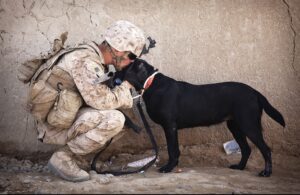
Veterans with PTSD may struggle with everyday tasks like going to the grocery store, being out in public, or acclimating to changing situations. It can be hard to nail down what triggers a veteran’s PTSD.
As a veteran, it can be even harder to manage your reaction to PTSD. There are various treatment options for PTSD.
However, service dogs are a great option to assist veterans with PTSD. Service dogs give the veteran something to focus on when triggered and act as emotional support daily. This article will discuss five ways service dogs help veterans with PTSD.
Number 1: Provide Emotional Support
A service dog is often seen as a companion and friend. They can offer veterans with PTSD a sense of comfort and support. Many veterans who struggle with PTSD often feel trapped by depression and anxiety.
A day-to-day companion can help relieve or lessen a veteran’s depression or anxiety.
A service dog can alleviate these symptoms by providing the veteran with regular physical touch, a routine, a sense of security, and much more.
Depression and anxiety can spiral out of control when you are left alone with your thoughts. If there is nothing to pull you out, it’s easy to lean into those feelings. A service dog can make a veteran feel less alone. They can also pull them out of an anxiety spiral or depressive episode by acting as a distraction and something to take care of.
Number 2: Provide a Routine
Veterans who have PTSD may find it difficult to stick to a healthy routine. When veterans have a service dog to take care of, they will be encouraged to stick to a routine, including regular daily feedings, walks, and training.
Having a routine will reduce feelings of uncertainty and unpredictability that veterans with PTSD often face.
Number 3: Encourage Physical Activity
As we mentioned above, a service dog must be walked on a regular cadence throughout the day. Veterans struggling with PTSD may find it hard to get regular exercise. When a veteran has a service dog, they can get outside and get fresh air multiple times a day.
Physical activity can do wonders for symptoms of PTSD. Exercise can help a veteran process traumatic memories by channeling stressful feelings associated with those memories into a positive and productive activity.
Additionally, exercise can increase cognitive function and endorphins and improve overall well-being. Having a service dog will only encourage and promote physical activity in a veteran’s life.
Number 4: Increases Social Interaction
Veterans with PTSD may find it hard to relate to others and interact in a social setting. Veterans with service dogs have shown that the companionship offered by their pets helped them make connections and seek out other human social interactions.
PTSD can be isolating, and the best way to overcome PTSD is by building a supportive community to help a veteran through the healing journey. A service dog can be the first and most incremental step in building a support system and overcoming PTSD.
Number 5: Alerting to Triggers
Service dogs can be trained to recognize their veteran companion’s triggers. They can then alert their veteran companion when they sense a triggering event might occur. Service dogs can help veterans move through the world more freely than if they navigate it independently.
Service dogs can assist a veteran with re-entering civilian life and make it safer for them and everyone around them to conduct day-to-day activities.
If you are a veteran struggling with PTSD, commit to a service dog.
Service dogs can play a vital role in helping veterans with PTSD. These specially trained animals can provide emotional support, help with triggers, encourage physical activity, enhance social interaction, and reduce symptoms of PTSD.
They can provide veterans with a sense of security, calmness, and companionship, helping them to cope with daily life and manage the symptoms of PTSD. It is important to note that service dogs are not a replacement for professional treatment, but they can be a valuable addition to a treatment plan for PTSD.
Veterans with PTSD must seek professional help and consult a healthcare professional before getting a service dog. With the right training, care, and support, service dogs can make a significant difference in the lives of veterans with PTSD.